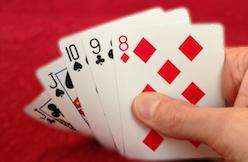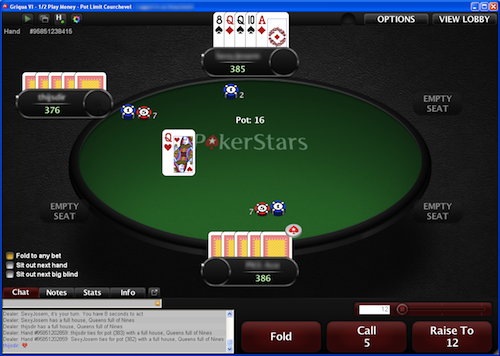PokerStars Introduces 5-Card Omaha, Courchevel
 Today PokerStars announced it will soon be introducing four new games, all variants of 5-Card Omaha. The games will begin appearing over the next couple of days across PokerStars’ shared liquidity sites (.com, .eu) and segregated market sites (.fr, .it, .es). The new games being introduced are 5-Card Omaha, 5-Card Omaha Hi/Lo, Courchevel, and Courchevel Hi/Lo.
Today PokerStars announced it will soon be introducing four new games, all variants of 5-Card Omaha. The games will begin appearing over the next couple of days across PokerStars’ shared liquidity sites (.com, .eu) and segregated market sites (.fr, .it, .es). The new games being introduced are 5-Card Omaha, 5-Card Omaha Hi/Lo, Courchevel, and Courchevel Hi/Lo.
The new games will be available to play both for play money and for real money. Pot-limit versions of all four games will feature stakes ranging from $0.10/$0.25 to $200/$400, with the stakes for fixed-limit versions of 5-Card Omaha Hi/Lo and Courchevel Hi/Lo ranging from $1/$2 to $1,000/$2,000. All 5-Card Omaha, 5-Card Omaha Hi/Lo, Courchevel, and Courchevel Hi/Lo games will be spread at six-handed tables.
5-Card Omaha has previously been scarce on online poker sites, having been once spread on the now-shutdown Entraction network of skins that also featured other obscure variants such as Soko and Telesina. Meanwhile, Courchevel has likely not been offered before in an online room.
While PokerStars has frequently introduced different stakes and modifications to existing games — including the launch of Zoom Poker in the spring of 2012 — these are the first new games to appear on the client since Badugi was introduced in October 2008, which at the time was the first new game to appear on the site since late 2006 when 5-Card Draw and 2-7 Triple Draw were initially rolled out.
As the name suggests, in 5-Card Omaha each player is dealt five hole cards rather than four, with the game subsequently playing much like regular Omaha insofar as players must build their hands using exactly two of their hole cards and three of the five community cards. The addition of the fifth hole card from which to choose obviously gives players more options when it comes to building hands, with hand values also being affected as well.
Courchevel poker introduces a further variation to regular Omaha. In Courchevel one is also dealt five hole cards, again selecting exactly two of those hole cards to match with three community cards in order to form one’s hand. Yet Courchevel introduces a difference into the way the community cards are dealt and the pattern of betting.
In Courchevel, players are dealt their five hole cards, then the first community card is revealed prior to the initial round of betting, after which the next two community cards are dealt (completing the flop). From there the game plays like other “flop games,” with betting rounds after the flop, turn, and river. Thus there are still four rounds of betting (as in regular and 5-Card Omaha), but the first round is conducted with players having knowledge of that initial community card, sometimes called the “preview” card.
PokerStars’s press release introducing the new games links to strategy videos appearing on both the DeucesCracked and CardRunners instructional websites offering advice about how to play 5-Card Omaha and Courchevel.
Courchevel is named after a ski resort located in the French Alps where the variation on 5-Card Omaha is thought to have been first introduced. However, most accounts of the origins of Omaha poker make note of the fact that it was not named after Omaha, Nebraska.
In Omaha Poker, Bob Ciaffone recounts the story of Omaha’s introduction at the Golden Nugget in Las Vegas in 1982, noting that the game in fact took its name from a variation of hold’em already being played in which players were dealt two hole cards then forced to use both when building their hands with the community cards (i.e., rather than having the option of using just one hold card or neither and play the board).
“Omaha hold’em” was thus a convenient and apparently idiosyncratic moniker used to distinguish the game from regular Texas hold’em. Ciaffone notes how the game was given other names as well (including “Greek poker”), while others have noted it being referred to by still more names during its early days (including “Nugget poker”).
Other accounts of Omaha’s origins suggest original versions of the game in fact involved players being dealt five hole cards, not four — thus suggesting 5-card Omaha is in fact a turn back to the game’s initial introduction — although Ciaffone makes no mention of such.




















COMMENTS